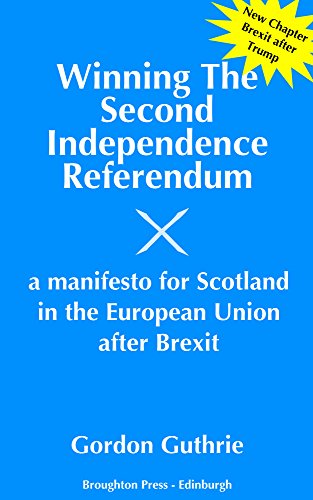Warning: Undefined array key "ssba_bar_buttons" in /usr/home/movgwifi/public_html/yesedinburghwest.info/wp-content/plugins/simple-share-buttons-adder/php/class-buttons.php on line 602
Warning: Undefined array key "ssba_bar_buttons" in /usr/home/movgwifi/public_html/yesedinburghwest.info/wp-content/plugins/simple-share-buttons-adder/php/class-buttons.php on line 602
Warning: Undefined array key "ssba_bar_buttons" in /usr/home/movgwifi/public_html/yesedinburghwest.info/wp-content/plugins/simple-share-buttons-adder/php/class-buttons.php on line 602
 Please buy the book here.
Please buy the book here.
The decisive vote in 2014 put Scottish independence on the back burner for a generation – and then the Brexit vote put it back front and centre. The last referendum was a fight between Continuity Scotland and actually-existing-Scotland. Brexit has destroyed both sides core economic cases. The collapse of the oil price and a hard tariff wall at Carlisle make the economic case for independence much more challenging. The poorly-thought out proposals for Brexit have destroyed the No campaign’s case for economic stability and reliability.
The key driver of the independence debate has moved away from Scotland and back to Westminster politics. Labour has almost ceased to exist and UKIP wait like the wolf to go after their seats in the north of England. The Tories remain split between hard-Brexiteers and pro-Europeans who want to remain in the single market. Politics in the UK will have a pronounced English nationalist flavour after the next election – one that will not be conducive north of the border.
The Scottish unionists are being left to swing in the wind, there is no impulse to rebuild a multi-national unionism amongst their erstwhile English colleagues.
So where does this leave the independence movement? The economic case was the weakest part of the prospectus in 2014, by some considerable measure. What was proposed then is entirely discredited. Hard questions on the currency and tax and spend must be addressed. There is no doubt that independence now would require a considerable financial retrenchment in the short and medium term.
The key focus must be on a restructuring of Scotland’s tax base – and positioning the economy for the future, the digital world.
But it is not all bad news. Europe remains a continent whose lingua franca is Standard American Business English – and small countries like Scotland and Ireland, whose populations are mostly fluent in it will do well. The flensing (paring down) of rUK’s European institutions and great universities bring opportunities.
This book systematically looks at Scotland’s institutions, economy, cities and cultural life and makes a set of 63 concrete recommendations, including:
- The Scottish Government should declare that the growth of the tax base is the single most important outcome of the Independence process, publish an immigration ambition (with newly targeted immigrants earning significantly above the current Scottish average salary), publish an ambition for growth of our academic research base, and target European-funded institutions.
- Transfer of powers from Westminster – with a default position of transfer unchanged, priority to economic transformation powers, contracting out of low priorities to rUK, recruiting civil servants
- Security – repatriation of anti-terrorism and security to be a priority
- Structure of government – add MPs to Holyrood cabinet, new committee to oversee transition (with a strong role for opposition parties), collaboration between Holyrood/ Stormont/ Dublin, creation of diplomatic service a priority, creation of treasury and central bank functions a priority
- Currency – new Scots currency to be issued at parity with £ sterling, floated after interim period, commitment to euro (but not now!), advice from N Ireland/ Czech Rep/ Slovakia on dual currency
- Political status – full political rights to all resident EU nationals, reciprocal rights to UK nationals etc
- Change Scottish Enterprise – new departments for flensing, relocation, high growth tech companies
- Changes to universities – grow research capability by poaching from rUK
- Changes to local government – tax and borrowing powers, transfer devolved powers downwards
- The built environment and regeneration to be run by local authorities, focus on high-density, low-occupancy housing (5-8 stories)
- Culture, promotion and soft power – Edinburgh Festival development, Erasmus, cuisine etc
- Reconciliation with opponents of independence – encourage participation and oversight
Yes Edinburgh West has a website, Facebook, Twitter, National Yes Registry and a Library of topics on Scottish Politics, including Independence.



